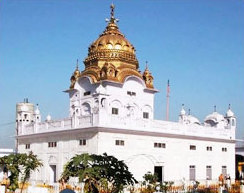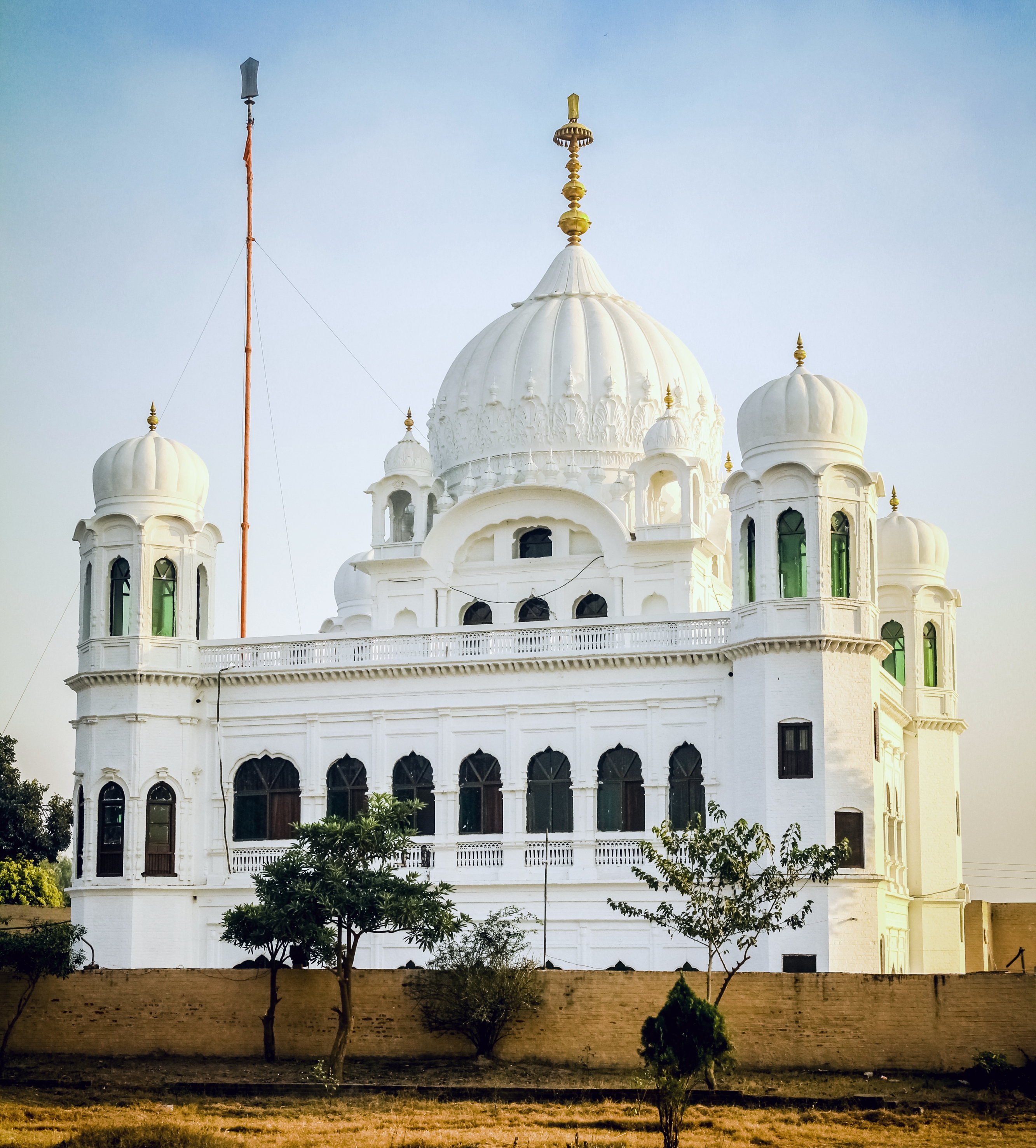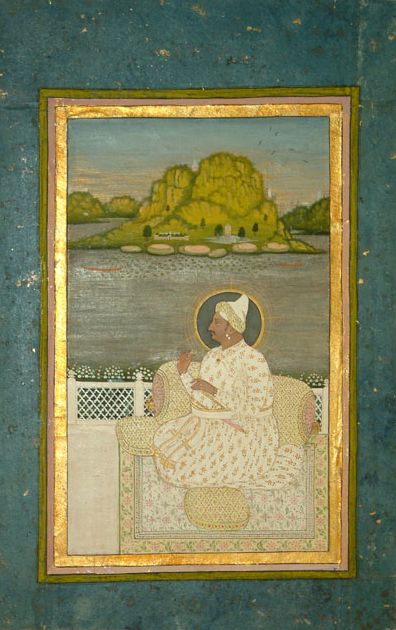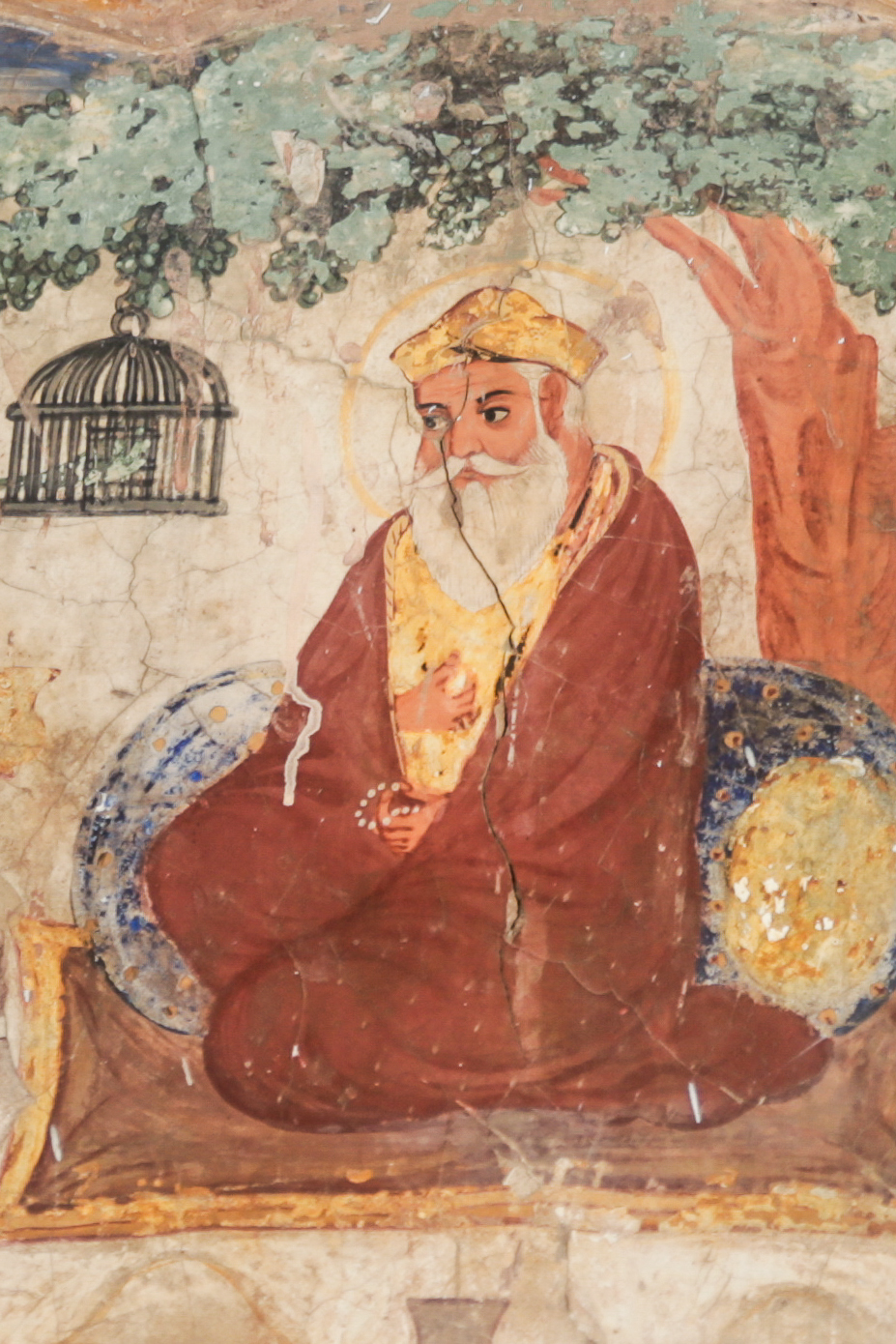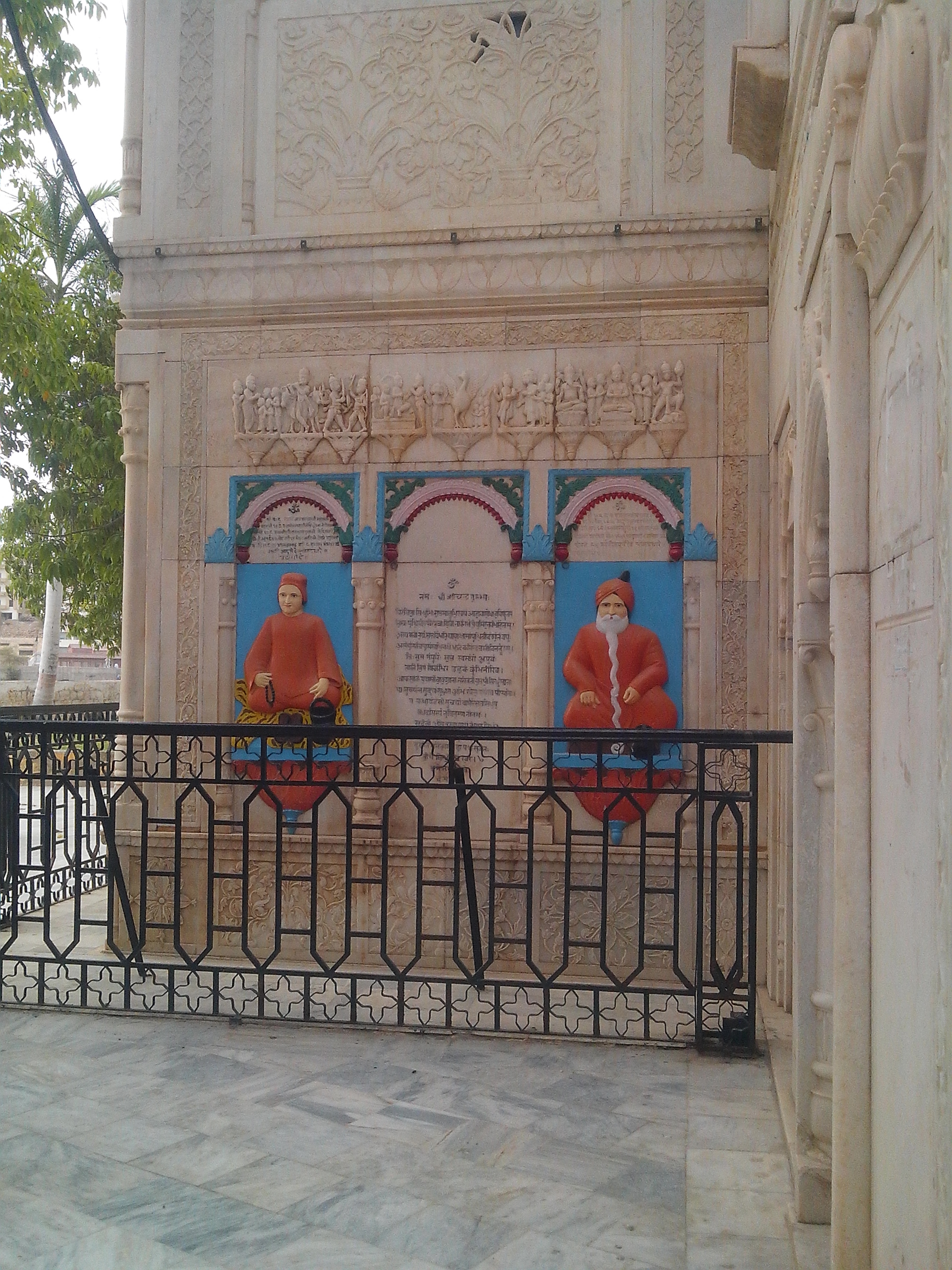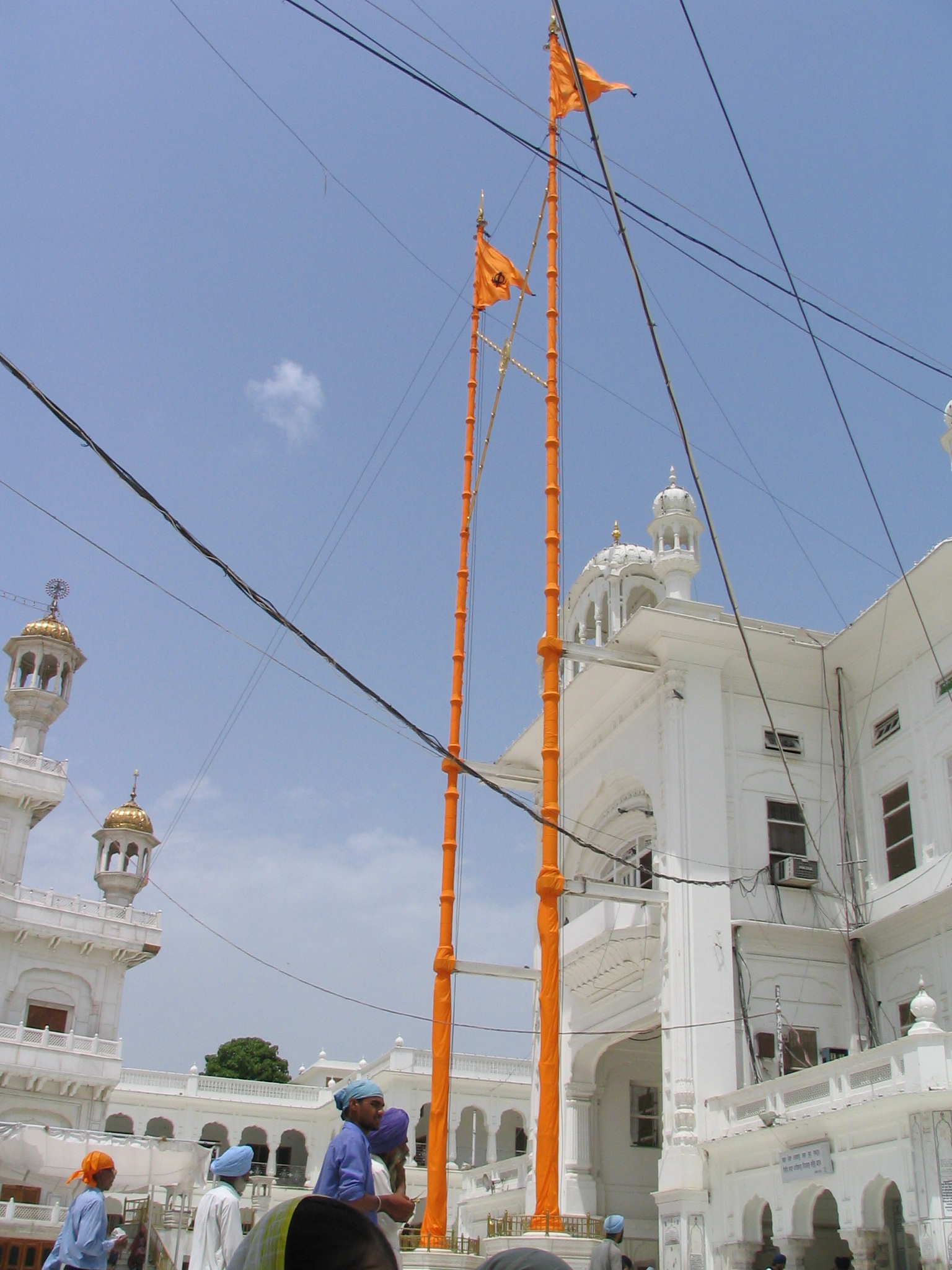|
Dera Baba Nanak
Dera Baba Nanak is a town and a municipal council in Gurdaspur district, in the state of Punjab, India. It is 36km away from Gurdaspur city, the capital of the district. Since November 2019, a corridor between India and Pakistan has been established at its shrine. Demographics India census, Dera Baba Nanak had a population of 7493. Males constitute 52% of the population and females 48%. Dera Baba Nanak has an average literacy rate of 75%, higher than the national average of 59.5%: male literacy is 78%, and female literacy is 72%. In Dera Baba Nanak 12% of the population is under 6 years of age. History Dera Baba Nanak, one of the most sacred places of the Sikhs, is situated on the banks of river Ravi. Three famous Gurudwaras at Dera Baba Nanak are Sri Darbar Sahib, Sri Chola Sahib and Tahli Sahib (Gurudwara of BaBa Sri Chand ji) eldest son of Guru Nanak, the first Sikh Guru. Guru Nanak, the first Sikh Guru settled and is believed to have "mingled with the Almighty" near the ... [...More Info...] [...Related Items...] OR: [Wikipedia] [Google] [Baidu] |
Kartarpur Corridor
The Kartarpur Corridor ( pa, ਕਰਤਾਰਪੁਰ ਲਾਂਘਾ , , translit=kartārpur lāṅghā; ur, , translit=kartárpúr ráhdári) is a visa-free border crossing and religious corridor, connecting the Gurdwara Darbar Sahib, near Lahore in Pakistan to Gurudwara Dera Baba Nanak, Gurdaspur district, Punjab, India. The crossing allows devotees from India to visit the gurdwara in Kartarpur, Pakistan, from the India–Pakistan border on the Pakistani side without a visa. However, Pakistani Sikhs are unable to use the border crossing, and cannot access Dera Baba Nanak on the Indian side without first obtaining an Indian visa or unless they work there. The Kartarpur Corridor was first proposed in early 1999 by Atal Bihari Vajpayee and Nawaz Sharif, the Prime Ministers of India and Pakistan respectively at that time, as part of the Delhi–Lahore Bus diplomacy.Rana, Yudhvir (3 July 2012)SGPC demands government to take up Dera Baba Nanak-Gurdwara Kartarpur Sahib corr ... [...More Info...] [...Related Items...] OR: [Wikipedia] [Google] [Baidu] |
Pakistan
Pakistan ( ur, ), officially the Islamic Republic of Pakistan ( ur, , label=none), is a country in South Asia. It is the world's List of countries and dependencies by population, fifth-most populous country, with a population of almost 243 million people, and has the world's Islam by country#Countries, second-largest Muslim population just behind Indonesia. Pakistan is the List of countries and dependencies by area, 33rd-largest country in the world by area and 2nd largest in South Asia, spanning . It has a coastline along the Arabian Sea and Gulf of Oman in the south, and is bordered by India to India–Pakistan border, the east, Afghanistan to Durand Line, the west, Iran to Iran–Pakistan border, the southwest, and China to China–Pakistan border, the northeast. It is separated narrowly from Tajikistan by Afghanistan's Wakhan Corridor in the north, and also shares a maritime border with Oman. Islamabad is the nation's capital, while Karachi is its largest city and fina ... [...More Info...] [...Related Items...] OR: [Wikipedia] [Google] [Baidu] |
Village Accountant
A Village accountant or Patwari (Punjab, Andhra Pradesh, Telangana, West Bengal), Talati (Gujarat, Karnataka, Maharashtra) or Lekhpal (Uttar Pradesh, Uttarakhand), is an administrative government position in rural areas of the Indian subcontinent. Introduced during the early 16th century, it was maintained by the British Raj. The official, as a representative of the state, is responsible for keeping land records, agricultural records and collecting taxes. History The ''patwar'' system, introduced to the Indian subcontinent during the rule of Sher Shah Suri, was further enhanced by the Mughal emperor Akbar. The East India Company and subsequently British crown continued with the system with some administrative changes. It denotes the office of the ''talati'' in rural Gujarat, Maharashtra and Karnataka. The office and its holder are known as Talatis, and holders of the office have adopted it as their family name. The ''talati'' replaced the ''kulkarni'' in Gujarat and Maharashtra. ... [...More Info...] [...Related Items...] OR: [Wikipedia] [Google] [Baidu] |
Gurdwara Darbar Sahib Kartarpur
Gurdwara Darbar Sahib Kartarpur, also called Kartarpur Sahib, is a gurdwara in Kartarpur, located in Shakargarh, Narowal District, in the Punjab province of Pakistan. It is built on the historic site where the founder of Sikhism, Guru Nanak, settled and assembled the Sikh community after his missionary travels ('' udasis'' to Haridwar, Mecca-Medina, Lanka, Baghdad, Kashmir and Nepal) and lived for 18 years until his death in 1539. It is one of the holiest sites in Sikhism, alongside the Golden Temple in Amritsar and Gurdwara Janam Asthan in Nankana Sahib. The gurdwara is also notable for its location near the border between Pakistan and India. The shrine is visible from the Indian side of the border. Indian Sikhs gather in large numbers on bluffs to perform '' darshan'', or sacred viewing of the site, from the Indian side of the border. The Kartarpur Corridor was opened by Pakistani Prime Minister Imran Khan on 9 November 2019, the anniversary of the fall of the Berlin Wall an ... [...More Info...] [...Related Items...] OR: [Wikipedia] [Google] [Baidu] |
Tehsil
A tehsil (, also known as tahsil, taluka, or taluk) is a local unit of administrative division in some countries of South Asia. It is a subdistrict of the area within a district including the designated populated place that serves as its administrative centre, with possible additional towns, and usually a number of villages. The terms in India have replaced earlier terms, such as '' pargana'' ('' pergunnah'') and '' thana''. In Andhra Pradesh and Telangana, a newer unit called mandal (circle) has come to replace the system of tehsils. It is generally smaller than a tehsil, and is meant for facilitating local self-government in the panchayat system. In West Bengal, Bihar, Jharkhand, community development blocks are the empowered grassroots administrative unit, replacing tehsils. As an entity of local government, the tehsil office ( panchayat samiti) exercises certain fiscal and administrative power over the villages and municipalities within its jurisdiction. It is the ultimate e ... [...More Info...] [...Related Items...] OR: [Wikipedia] [Google] [Baidu] |
Khatri
Khatri is a caste of the Indian subcontinent that is predominantly found in India, but also in Pakistan and Afghanistan. In the subcontinent, they were mostly engaged in mercantilistic professions such as banking and trade, they were the dominant commerical & financial administration class of Late-Medieval India some in Punjab often belonged to hereditary agriculturalist land-holding lineages, others were engaged in artisanal occupations such as silk production and weaving while some were scribes learned in Sanskrit and Persian too During the British colonial era, they also served as lawyers and engaged in administrative jobs in the colonial bureaucracy. Some of them served in the British Indian army after being raised as Sikhs. The Sikh religion was founded by Guru Nanak, a Bedi Khatri. Subequently, all the Sikh religious leaders or Gurus were Khatris. During the Sikh Empire, many Khatris formed the military vanguard of the Khalsa Army and it's administrative class as ... [...More Info...] [...Related Items...] OR: [Wikipedia] [Google] [Baidu] |
Kartarpur, Pakistan
Kartarpur (Punjabi , Urdu: ; Punjabi : ਕਰਤਾਰਪੁਰ) is a town located, near Lahore in the tehsil Shakargarh, Narowal District in Punjab, Pakistan. Located on the right bank of the Ravi River, it is said to have been founded by the first guru of Sikhism, Guru Nanak, where he established the first Sikh commune. Geography Kartarpur is located at . It is located in Narowal, Punjab, Pakistan. It has an average elevation of 155 metres (511 feet). History The first guru of Sikhism, Guru Nanak, founded Kartarpur in 1504 AD on the right bank of the Ravi River. The name ''Kartarpur'' means "city of Creator or God", from Punjabi "ਕਰਤਾਰ" (Kartar) meaning 'Creator' or 'Lord of Creation' and "ਪੁਰ" (Pur) meaning 'City'. Here all people, irrespective of their religion or caste, lived together, representing the first 'Sikh commune'. After his travels for about 20 years, Guru Nanak settled in Kartarpur along with his family. Following his death in 1539, ... [...More Info...] [...Related Items...] OR: [Wikipedia] [Google] [Baidu] |
Pakhoke Mehmaran
Pakhoke Mehmaran is a village in Dera Baba Nanak in Gurdaspur district of Punjab State, India. It is located from Gurdaspur, district headquarter and from Dera Baba Nanak, sub district headquarter. The village is administrated by Sarpanch an elected representative of the village. Demography , The village has a total number of 118 houses and the population of 676 of which 349 are males while 327 are females. According to the report published by Census India in 2011, out of the total population of the village 172 people are from Schedule Caste and the village does not have any Schedule Tribe population so far. See also *List of villages in India Villages India India, officially the Republic of India (Hindi: ), is a country in South Asia. It is the seventh-largest country by area, the second-most populous country, and the most populous democracy in the world. Bounded by the Indian ... References External links Tourism of PunjabCensus of Punjab Villages ... [...More Info...] [...Related Items...] OR: [Wikipedia] [Google] [Baidu] |
Sikh Gurus
The Sikh gurus (Punjabi: ਸਿੱਖ ਗੁਰੂ) are the spiritual masters of Sikhism, who established this religion over the course of about two and a half centuries, beginning in 1469. The year 1469 marks the birth of Guru Nanak, the founder of Sikhism. He was succeeded by nine other human gurus until, in 1708, the '' Guruship'' was finally passed on by the tenth guru to the holy Sikh scripture, Guru Granth Sahib, which is now considered the living Guru by the followers of the Sikh faith. Etymology and definition ''Guru'' (, ; sa, गुरु, Punjabi: ਗੁਰੂ, IAST: ''guru'') is a Sanskrit term for a "teacher, guide, expert, or master" of certain knowledge or field. Bhai Vir Singh, in his dictionary of Guru Granth Sahib describes the term Guru as a combination of two separate units: "Gu;(ਗੁ)" meaning darkness and "Rū;(ਰੂ)" which means light. Hence, Guru is who brings light into darkness or in other words, the one who enlightens. Bhai Vir Singh's defi ... [...More Info...] [...Related Items...] OR: [Wikipedia] [Google] [Baidu] |
Sri Chand
Sri Chand (8 September 1494–13 January 1629, Gurmukhi: ਸ੍ਰੀ ਚੰਦ), also referred to as Baba Sri Chandra or Bhagwan Sri Chandra, was the founder of the Udasi sect of ascetic Sadhus. Early life He was the eldest son of Guru Nanak, the first Guru and founder of Sikhism. He was born to Mata Sulakhani on Bhadra sudi 9, 1551 Bikrami (i.e. 8 September 1494). Sikh sources give his life the impressive dates of 8 September 1494 – 13 January 1629, which would have made him 134 years old upon his death. Relationship with Sikh Gurus It is believed that Sri Chand rejected Angad as the successor to his father. When the Sikh guruship passed from Nanak to Angad, the sons of Nanak, Sri Chand and Lakhmi Das, made a legal claim to their father's properties in Kartarpur, forcing Guru Angad to reestablish the early Sikh community's centre at his native village of Khadur instead. Guru Amardas declared active and domestic Sikhs to be separate from passive and recluse Udasins ... [...More Info...] [...Related Items...] OR: [Wikipedia] [Google] [Baidu] |
Gurudwara
A gurdwara (sometimes written as gurudwara) (Gurmukhi: ਗੁਰਦੁਆਰਾ ''guradu'ārā'', meaning "Door to the Sikh gurus, Guru") is a place of assembly and place of worship, worship for Sikhs. Sikhs also refer to gurdwaras as ''Gurdwara Sahib''. People from all faiths are welcomed in gurdwaras. Each gurdwara has a ''Darbar Sahib Hall, Darbar Sahib'' where the current and everlasting guru of the Sikhs, the scripture Guru Granth Sahib, is placed on a (an elevated throne) in a prominent central position. Any congregant (sometimes with specialized training, in which case they can be known by the term granthi) may recite, sing, and explain the verses from the Guru Granth Sahib, in the presence of the rest of the congregation. All gurdwaras have a hall, where people can eat free vegetarian food served by volunteers at the gurdwara. They may also have a medical facility room, library, nursery, classroom, meeting rooms, playground, sports ground, a gift shop, and finally a repair ... [...More Info...] [...Related Items...] OR: [Wikipedia] [Google] [Baidu] |
